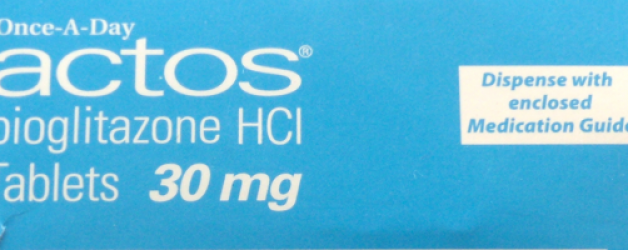On June 15, 2011, the U.S. Food & Drug Administration (FDA) issued a safety communication stating that use of Actos for more than one year may be associated with an increased risk of bladder cancer. The June safety communication was a follow-up to one the agency issued in September 2010 after preliminary data from a study conducted by Kaiser Permanente demonstrated that the risk of bladder cancer rises with increasing dose and duration of Actos use, reaching statistical significance after 24 months.
Since the FDA issued this announcement, hundreds of people around the U.S. have filed Actos bladder cancer lawsuits, and legal experts believe that the drug maker could eventually face more than 10,000 personal injury claims.
Actos (pioglitazone) was approved by the FDA to treat Type 2 Diabetes in July, 1999. It is a once-a-day pill that increases the body’s sensitivity to insulin.
The medication has grown in popularity in recent years, following concerns about a risk of heart problems from Avandia, the primary competitor for Actos. Annual sales have grown to an estimated $4.3 billion, but that is expected to fall off in the coming years, due to a generic being introduced to the market, as well as the potential increased risk of bladder cancer.
Just last month, another 4 have alleged that the maker of the drug, Takeda Pharmaceuticals is at fault. All of the lawsuits claim that plaintiffs named in the complaint were diagnosed with bladder cancer after taking Actos, a popular treatment for type 2 diabetes sold by Takeda Pharmaceuticals.
The lawsuits all name the men’s’ wives as co-plaintiffs. Each is seeking more than $50,000 in actual damages along with punitive damages and court costs.
In Louisiana, a Houma man who says he developed bladder cancer after taking Actos for more than a year is demanding an unspecified amount of damages from Takeda and other defendants. Russell Samanie’s complaint, filed in federal court in New Orleans, alleges:
“Defendants concealed and continue to conceal their knowledge that Actos can cause bladder cancer from (Samanie), other consumers, and the medical community,” the suit says. “Specifically, (the) defendants have yet to adequately inform consumers and the prescribing community about the risks of bladder cancer with use of Actos for more than 12 months.”
The same month that the US FDA announced it’s safety communication, the French and German governments decided to suspend sales of Actos in those countries after a separate study commissioned by French regulators demonstrated an increased risk of bladder cancer associated with Actos in people who took it the longest and at the highest cumulative dose. Then, on July 12, Takeda Pharmaceuticals officially recalled Actos from the market in France.
All of the complaints over bladder cancer from Actos filed in state and federal courts throughout the United States raise similar allegations that Takeda knew or reasonably should have known that long-term Actos use increased the risk of bladder cancer. Despite the known risk, users allege that Takeda failed to provide adequate Actos bladder cancer warnings for consumers or the medical community.
In December, a federal panel ordered that all Actos bladder cancer lawsuits filed in federal courts be consolidated in a multidistrict litigation and transferred to the U.S. District Court, Western District of Louisiana.

